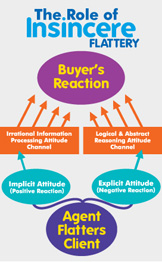INSIDER: In an Age of Authenticity, Does Insincere Flattery Fit?
By Donald Jackson, MBA Candidate
Does insincere flattery actually work? How can understanding the psychology behind flattery allow an agent to maximize his/her ability to attract more clients and close more deals? In "Insincere Flattery Actually Works: A Dual Attitudes Perspective" from the February 2010 issue of the Journal of Marketing Research, Elaine Chan and Jaideep Sengupta use the scientific method to show that even when flattery is accompanied by an obvious ulterior motive that leads targets to discount the proffered compliments, the initial favorable reaction (the implicit attitude) is not eliminated, but continues to coexist, and have far more influential consequences than the discounted evaluation (explicit attitude). Chan and Sengupta's research offers insight into ways real-estate agents can recognize those implicit and explicit attitudes, and maximize the effects that flattery has on a buyer's decision process. Chan and Jaideep (2010) state that people who are on the receiving end of insincere flattery are more likely than not to view the giver of the flattery in a positive light. This phenomenon directly corresponds with people's innate desire to view themselves in a positive light.

THINK POINT #1:
Buyers seek real-estate agents whom they can trust and rely upon to provide accurate information and great service; however, the first-impression is a critical step in forming these relationships. A bit of flattery can be used effectively as a great tool during first encounters to jump-start these relationships, and establish a positive view from the buyer's perspective. Dual attitudes theory suggests that the positive and negative feelings that customers experience after detecting insincere flattery actually coexist with one another. These two feelings are respectively defined as the implicit and explicit attitudes. The authors' research indicates that not only is the implicit attitude (positive reaction) more resistant to negative information, it is also a better predictor of how buyers will respond in the near future when compared to the explicit attitude (negative reaction) that it coexists with.
THINK POINT #2:
Agents should search for creative and unique ways to make flattery a normal part of their routine. The positive vibes that are generated through flattery are more likely to influence customer behavior and decision-making than any negative connotations that might arise from detections of insincerity. By using flattery as a self-enhancement mechanism, customers are most likely to disregard the insincerity in favor of the positive notion, and are more likely to make a purchase. The explicit attitude arises from logical and abstract reasoning while the implicit attitude is derived from an irrational form of information processing which involves simple association formation. Given that these two attitudes coexist, a selling strategy that takes advantage of both rational and emotional behaviors would have the most effect on a buyer's decision process.
THINK POINT #3:
Real estate agents who provide positive feedback, accurate pricing and information, and top-tier analytical insight are more likely to strike a chord with customers who exhibit sound reasoning and good judgment. Given that the implicit and explicit attitudes co-exist, real estate agents can reap the benefits from both attitudes through gratitude, charisma, professionalism and knowledge. Never be afraid to connect to the personal side of business negotiations through flattery. The positive effects of flattery greatly outweigh the negative effects in the long-run. Customers are also more likely to recall the positive flattery when approached with alternate offers and propositions.
THINK POINT #4:
There is no question that flattery works. Real estate agents can become consumed by tons of information in work place. Due to these constraints, agents may need to be reminded not to overlook the subtle comments that can put buyers at ease and gain trust. Professionalism and knowledge are irreplaceable assets to the portfolio of a real estate agent; however, they serve as great compliments to charisma and flattery; regardless of the validity.
THINK POINT #5:
The author describes the self enhancement motive as the vehicle that drives the consumer to respond favorably to any form of flattery regardless of hidden agendas or ulterior motives. No matter the industry or atmosphere, people love to be acknowledged, and receive positive feedback that will boost their self image. Flattery can be used as part of great marketing to finalize deals and attract potential customers.
. . . . . . . . . . . . . . . . . . .
Recommended Reading
Chan, Elaine and Jaideep Sengupta (2010), "Insincere Flattery Actually Works: A Dual Attitudes Perspective," Journal of Marketing Research (February), 122-133.
. . . . . . . . . . . . . . . . . . .
About the Author
Donald J. Jackson Jr., MBA - Healthcare Candidate, Dec. 2010, Baylor University
Graduate Assistant, Keller Center for Research and Center for Professional Selling
Donald (D.J.) is a second-year graduate student from Houston, TX currently pursuing a specialized MBA degree in healthcare administration. He graduated from Baylor University in 2008 with a B.S. in Economics, and completed his seven-month administrative residency with HCA Inc. in 2009.